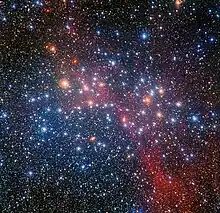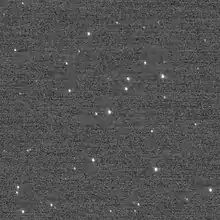NGC 3532
NGC 3532 (Caldwell 91),[8] also commonly known as the Pincushion Cluster,[9][10][11][8] Football Cluster,[12][13] the Black Arrow Cluster[14] and the Wishing Well Cluster,[4][5][6][7] is an open cluster some 405 parsecs from Earth[2] in the constellation Carina. Its population of approximately 150 stars of 7th magnitude or fainter includes seven red giants[15] and seven white dwarfs.[16][17] On 20 May 1990 it became the first target ever observed by the Hubble Space Telescope. A line from Beta Crucis through Delta Crucis passes somewhat to the north of NGC 3532. The cluster lies between the constellation Crux and the larger but fainter "False Cross" asterism. The 4th-magnitude Cepheid variable star x Carinae (V382 Car) appears near the southeast fringes, but it lies between the Sun and the cluster and is not a member of the cluster.
| NGC 3532 | |
|---|---|
 | |
| Observation data (J2000 epoch) | |
| Right ascension | 11h 05m 33s[1] |
| Declination | −58° 43.8′[1] |
| Distance | 1,321[2] ly (405 pc) |
| Physical characteristics | |
| Other designations | NGC 3532,[1] Caldwell 91, Cr 238, Mel 103, C 1104-584, Cl* 1104-584, CL 1104-584, Lacaille II.10,[3] Football Cluster, Wishing Well Cluster[4][5][6][7] |
| Associations | |
| Constellation | Carina |
The cluster was first catalogued by Nicolas Louis de Lacaille in 1752. It was admired by John Herschel, who thought it one of the finest star clusters in the sky,[3][18] with many double stars (binary stars).[19]
Hubble first light
.png.webp)

References
- "NGC 3532". SIMBAD. Centre de données astronomiques de Strasbourg. Retrieved 2010-05-23.
- Robichon, N.; et al. (2005). "Open clusters with Hipparcos. I. Mean astrometric parameters". Astronomy and Astrophysics. 345: 471–484. arXiv:astro-ph/9903131. Bibcode:1999A&A...345..471R.
- Deep Sky Observer's Companion – the online database, DOCdb Lacaille II.10
- Nemiroff, R.; Bonnell, J., eds. (26 February 2010). "Chasing Carina". Astronomy Picture of the Day. NASA. Retrieved 17 April 2016.
- Hook, Richard (26 November 2014). "A Colourful Gathering of Middle-aged Stars". European Southern Observatory. ESO. Retrieved 17 April 2016.
- Kramer, Miriam (26 November 2014). "Wishing Well Star Cluster Sparkles in Colorful New Views". Space.com. Space.com. Retrieved 17 April 2016.
- Frommert, Hartmut; Kronberg, Christine (23 June 2006). "NGC 3532". SEDS Messier Database. SEDS. Retrieved 17 April 2016.
- Martin Mobberley (Oct 2009). The Caldwell Objects and How to Observe Them. Springer. p. 190. ISBN 978-1-4419-0326-6.
- Stephen James O'Meara, The Caldwell Objects, Cambridge University Press, ISBN 0-521-82796-5, p. 358–360.
- Mike Inglis (July 2013). Observer's Guide to Star Clusters. Springer. p. 55. Bibcode:2013ogsc.book.....I. ISBN 978-1-4614-7567-5.
- Michael E. Bakich (July 2010). 1,001 Celestial Wonders to See Before You Die. Springer. p. 80. Bibcode:2010ocws.book.....B. ISBN 978-1-4419-1777-5.
- Amateur Astronomer Association of New York, Nebula of the Month - Carina's Football
- IceInSpace - Australian Amateur Astronomy, Challenge Objects - June 2005, 2005
- Chadwick, S; Cooper, I (11 December 2012). Imaging the Southern Sky. New York: Springer. p. 94. ISBN 978-1461447498.
- Claria, J.J., Lapasset, E., (1988) "A UBV and DDO astrophysical study of the open cluster NGC3532", Monthly Notices of the Royal Astronomical Society, 235, 1129–1139
- Reimers, D., Koester, D., (1989) "Spectroscopic identification of white dwarfs in galactic clusters. V - NGC 3532", Astronomy & Astrophysics, 218, 118–122
- Dobbie, P., Day-Jones, A., Williams, K., Casewell, S., Burleigh, M., Lodieu, N., Parker, Q., Baxter, R. (2012) "Further investigation of white dwarfs in the open clusters NGC2287 and NGC3532", Monthly Notices of the Royal Astronomical Society, 423, 2815–2828
- Herschel, J. (1847). Results of Astronomical Observations Made During the Years 1834, 5, 6, 7, 8, at the Cape of Good Hope. London, Smith, Elder &Co.
- ScienceDaily, "A colorful gathering of middle-aged stars", European Southern Observatory, 26 November 2014
- First Image Taken by Hubble's Wide Field Planetary Camera, Hubblesite.org
- "Great Exploration Revisited: New Horizons at Pluto and Charon".
External links
- NGC 3532 on WikiSky: DSS2, SDSS, GALEX, IRAS, Hydrogen α, X-Ray, Astrophoto, Sky Map, Articles and images